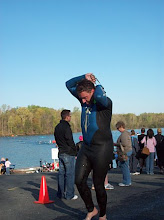Good evening.
Here is a question for you. What feels right? Is it a down comforter? A warm bath? Do you feel good when you look at a forest of trees or a grassy meadow? Does certain music calm you? Better yet, how does your body know that the particular stimuli is good, bad, dangerous, funny, etc.? It knows because it is trained. Whether by deep rooted genetics, past experience, or even trauma association, we respond according to some “memory” that is put in place.
This type of response to situations can throw a real wrench into the plans when racing. Most commonly, this psychosomatic association occurs in swimming. Why? Quite simply it is the one athletic event that is about as abnormal as you can get. In most other sports oxygen as abundantly available and you can breathe as much as you want. Swimming, however, is a different beast. A lot of the time in a swim you don’t have available oxygen, rather you have to make an effort to get it. This can cause a very normal response in humans: panic. There is nothing wrong with that. In fact, I would be worried about the individual that did not panic when deprived of air.
Many people ask the stronger swimmers why they look so effortless in the water while the beginners look like they need to be rescued. It is a twofold cause. One is the fact that many beginners have inefficient strokes to begin with. But the more important factor is how they handle the “panic”. I have swam since I was 9 years old, often in a competitive environment. I probably have logged enough meters to swim from here to the moon. However, I am not immune to the panic feeling. I don’t think my twenty some years of swimming is going to override the eons of human biology. Though I may panic, I am used to the panic and I welcome it. Much like the motorcycle racer who travels at 150 mph for a living, I know the panic isn’t normal, but I come to peace with it knowing there is no way for me to eliminate it. This lets me relax and get through the swim.
For the beginners, I can only suggest doing breathing drills and timing drills. One great drill is to swim sets of 200s and breath every fourth stroke. This will help time correct inhalation and exhalation. In turn it will ensure proper breathing. The other thing to do is go to the deep end and breathe out all of your air until you sink, count to twenty, and come to the surface. If you aren’t feeling the panic then, you aren’t doing it right. The benefit is it will generate the panic in a controlled environment.
In the end, we must face the hardest things for us and find ways to battle. Otherwise a simple mental hiccup could be the difference between a personal best and an average run.
Until next time-lux aeterna.
Race smart.
-The Mental-ist
Thursday, April 30, 2009
Subscribe to:
Post Comments (Atom)

No comments:
Post a Comment